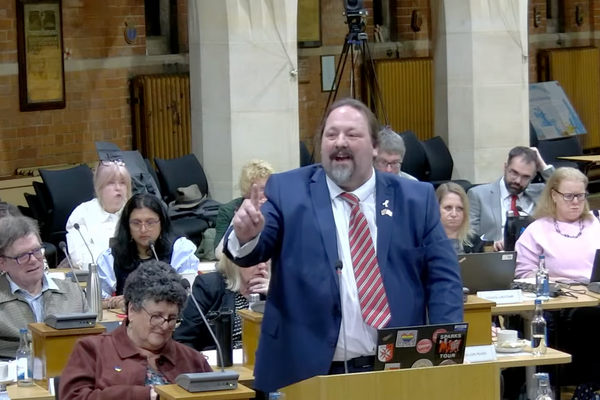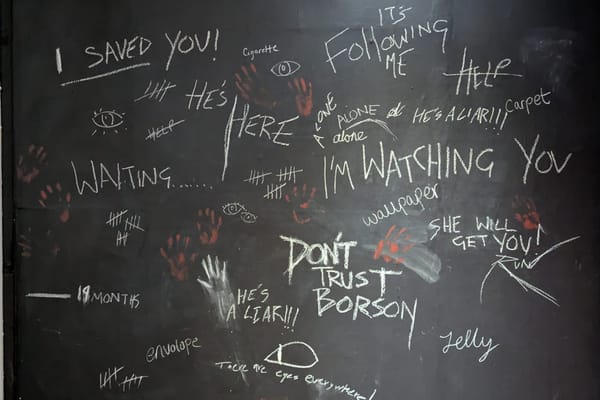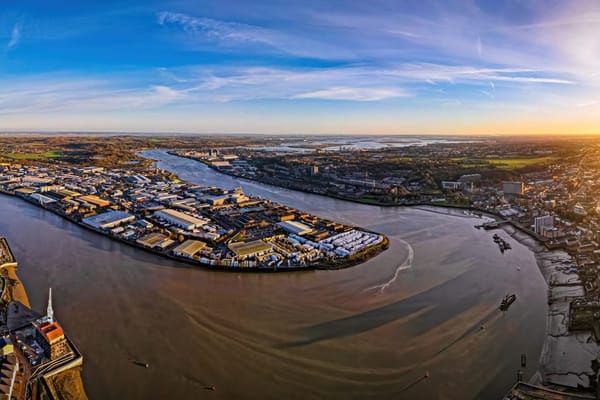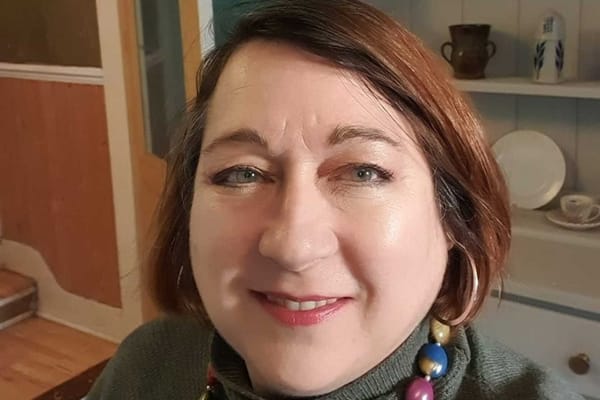“I don't identify really as Billy Childish”
What Steven asked Billy Childish, artist, writer, musician, and poet.
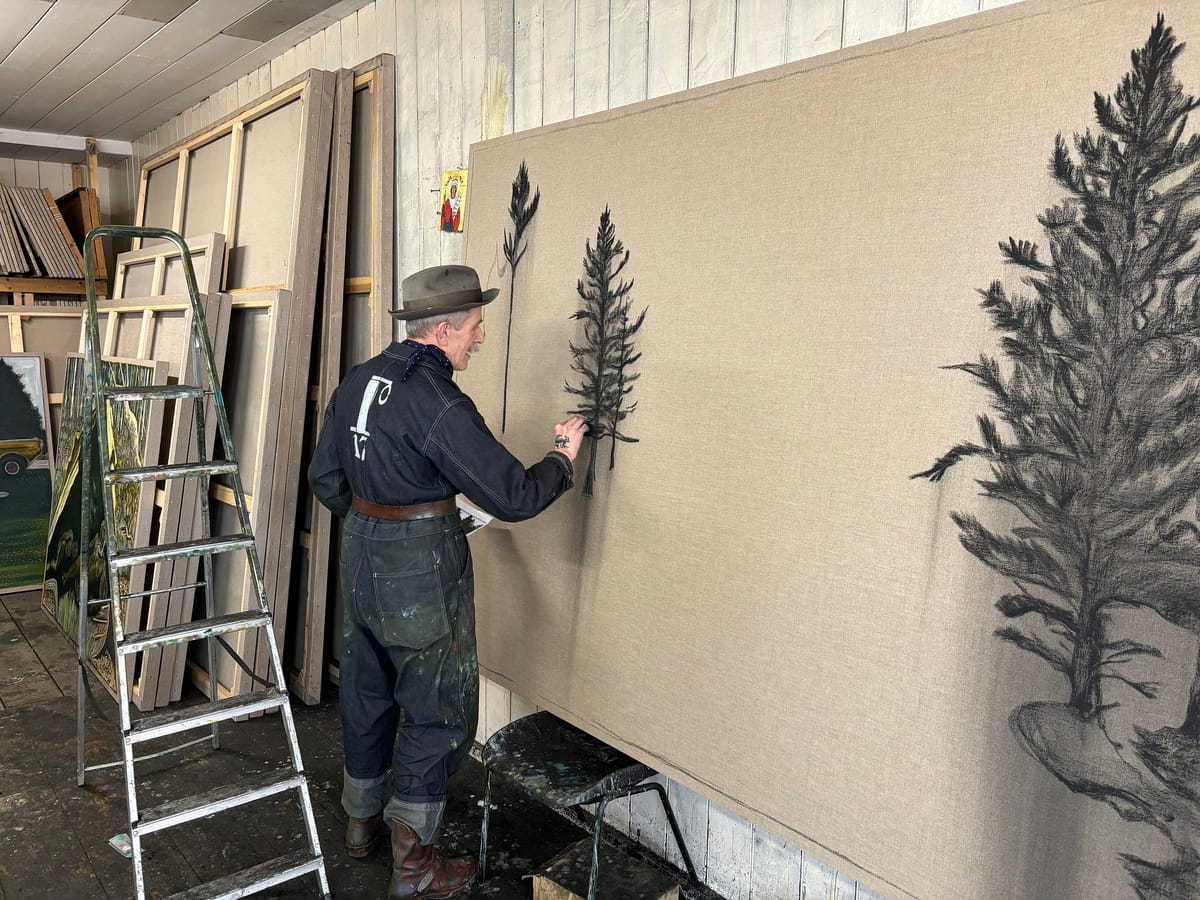
In our first Sunday interview that couldn’t be contained to only one part, we talked to legendary Medway artist, writer, musician, and poet Billy Childish. Steven met Billy in his studio at Chatham Dockyard, speaking to him whilst he painted.
In this first part, they talk about the name Billy Childish, other names he uses, his family’s connection to the Medway Towns, getting an honorary doctorate, and how everything you’ve heard is probably true.
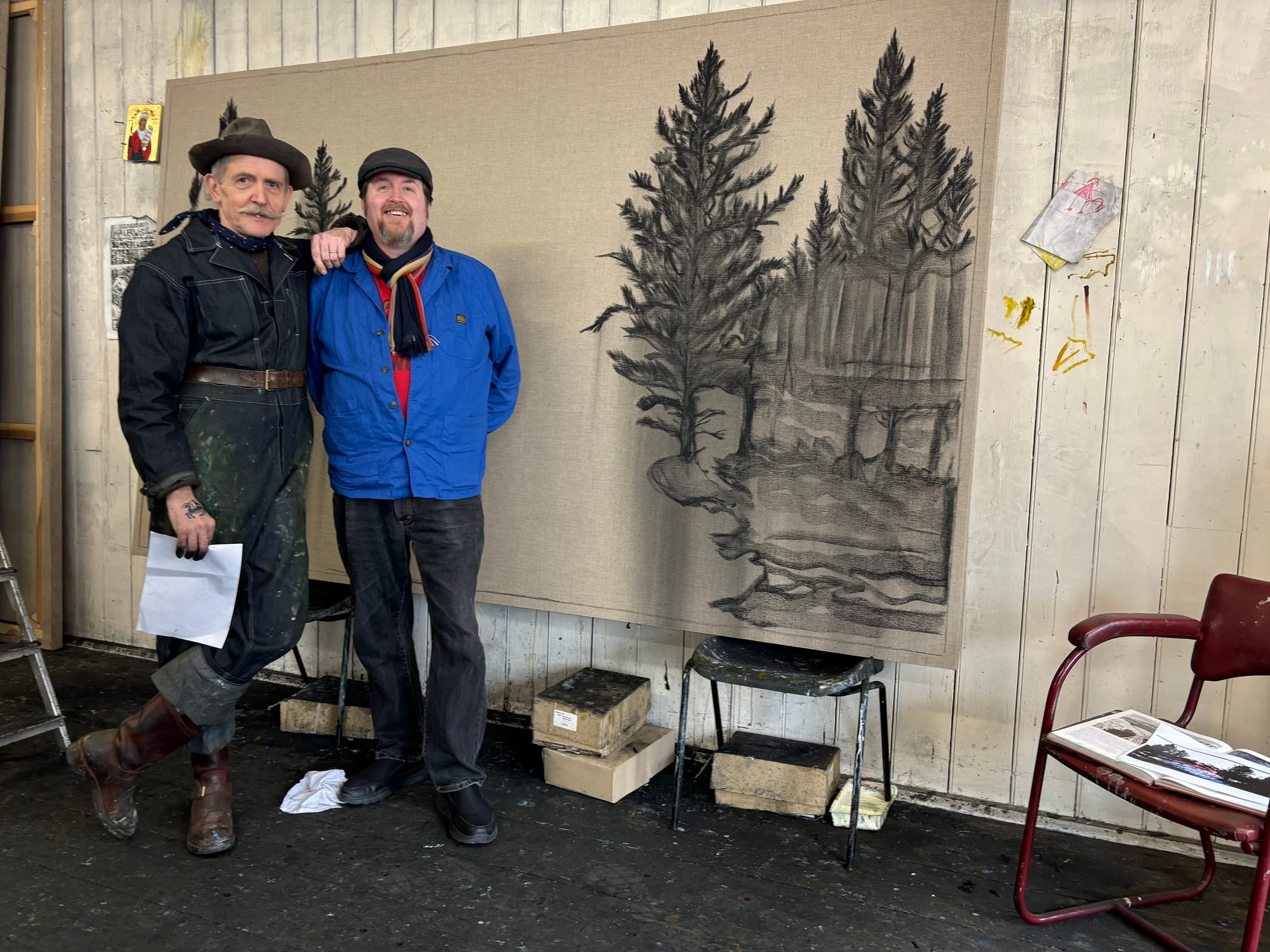
Could you spell your name for the record?
Now he wants me to spell. B I double L Y C H I L D I S H. Not bad for a dyslexic.
I have seen it as Chyldish with a Y. Is there a reason why you might do that?
I do that sometimes, yeah. I like the shapes of letters. I like irregularity in odd bites. I don’t know why I do that. It’s also because I don’t really identify as this Billy Childish. It’s all just a bit of fun.
You've given a number of interviews over the years. I'll definitely ask some similar questions. Does retelling your story bother you?
It really depends on who you're talking to. You're a charming, easy person. There’s a biography being published in two months that's been written by Ted Kessler. I met Ted when he was a kid, he interviewed me for a fanzine. When we did ‘We Hate the Fuckin’ NME’ as a 45 and Ted was on the NME, rather than crying like a lot of them, he put it on the answer phone. I'm not mates with Ted, but Ted's a published writer. Ted would be someone I'd trust to do it, although I refuse to read it or see what it is because I don't really want to know too much about it because it would just be too annoying for me. There'll be too many errors.
I don't identify really as Billy Childish, I don't understand what that would be. I don't give a shit. I don't identify as an artist, and I don't care about that.
Do you ever Google yourself?
Yes, I do. I do a lot of spying on the internet. I don't do social media, but I spy on social media. Huddie (Billy’s son) does an Instagram page and I'm reasonably fascinated by how bad a review can be, or how accurate in that sense. I can put up with a paragraph or maybe just a one sentence dismissal. I enjoy accurate reviews and cleverly insulting reviews and things when they're succinct and abusive in an amusing way. I hate inaccuracy. The trouble with reviews is you're usually reviewed on the basis of something not achieving what it wasn't even trying to achieve. The Milkshakes were derided for not being something else. I'm often derided for not being something else. Having a slight public persona, people already know who you are, and they know nothing of who you are. I'm not like my poetry because that's what the poetry's like. I'm not that interested in the idea of who I'm meant to be. I don't identify really as Billy Childish, I don't understand what that would be. I don't give a shit. I don't identify as an artist, and I don't care about that. If I'm an artist anytime it's when I'm making pictures. I'm not signed to any of my galleries. Everything's done on a handshake. I'm not signed to any labels. I don't do contracts because I work with people who I like and who like me. I take people as I find them, I don't care what their background is.
Where did the name Billy Childish come from?
When I was at school, when I was a punk rocker, in ’77, and ‘Button Nose’ Steve, who was one of the six in Medway who liked punk rock music. We would go up to London to see bands in London. I wanted to have a pseudonym because everybody had one. I was doing a fanzine as Gus Claudius because I was a big fan of ‘I, Claudius’, which was on television at the time. He said, ‘No, you are Billy Childish’. Years and years later, about 12 years ago, when I had my overnight success as a painter, someone asked me why I was called Billy Childish and I said, ‘I don't know, Button Nose Steve is here. Let's go and ask him.’ We went and asked him, and it was because I used to pretend to be mentally retarded in public and would sort of pretend to have fits and things and generally be a fool. He said I was very childish in my behaviour.
Do you remember doing that?
Yes, I recognised it when he said it.
Was there a reason why you would do that?
It was various things. You know, I came from a very different time period. I was brought up on comedy, and everything was derisive and silly, and blackly comic. I used to have a short back and sides, and I used to put lobotomy scars with makeup on my hairline, which would stop people from picking on me in public because I dressed quite strangely, and you were always a target of violence. I suppose that was part of it, but I've always been known for being a little bit silly because I like silliness.
Does anyone still call you by your birth name?
I don’t know, I don’t think so. I met some people from Walderslade Secondary School on the high street the other day, and they did still refer to me as Steve Hamper. When I was a kid, I used to use lots of different names anyway. Only answering to Virgil and things like that. Everyone in my family, I think, didn't have their correct name, or not many of them. My grandmother was Aggie. That wasn't her name. My father's name was John. That wasn't his name. I use so many different pseudonyms on different things.
William Loveday?
That was from my grandmother Ivy, William Ivy Loveday. They were from Rainham, well more from Wigmore, Bredhurst. My mum’s family.
If somebody called you Steve, would you still answer?
I might, as long as they were being polite. I’ve been called a lot worse. I use Guy Hamper, Jack Ketch, Gus, and all sorts of things.
Is there a reason you might use a particular name? So there will be a Guy Hamper project?
Yeah, I like separating things out, and I also use others like ‘Odysseus’ if I'm doing things and I don't want people to know who I am. Publishing things under different names sometimes because I don’t like things standing by the name.
It’s important to you for people to buy it for the work, not because it's a Billy Childish piece?
Well, sort of, yeah. I realised I got lucky with the Billy Childish thing in the sense that it hasn’t done us any harm. It looked after us. I don’t really buy into the identity at all really. If it’s handy, it’s handy.
What was interesting when researching and preparing for this interview was trying to differentiate between the reality and the myth.
Yeah.
You say you like using humour. How often have you embellished or made up a bit of backstory?
Very rarely, actually. I’m really a very honest person. If I was to pull a practical joke and you fell for it, I would have to explain that it was a joke. I find lies and deception, although interesting, not something I want to be involved in. My father was more self-invented. I won't even lie about unimportant things in general.
Essentially, if I've read it in the prep, then it's more than likely actually true?
More than likely, yeah.
We're here at your studio today. How did you end up here at the Dockyard?
Because I had my overnight success when I was 50, I was then asked if I would put an exhibition on in the Dockyard. I was looking to have a studio anyway, so I said, ‘Yes, I would be willing to do the exhibition, would it be possible to make it on site?’ They had this room. I had tried to get a studio here before and been unsuccessful, but in this situation, it held together.
What was it like to be artist in residence at the Dockyard?
It's sort of like a non-existent thing, really. What I do is I give them paintings for the space. I give to their archive. I give them work to pay my rent. They have got a collection of Dockyard-related paintings. I have no real interaction with them other than that. I'm really bad at people having requirements of me. I don’t do commissions. I don't do any work to order in music, writing or anything. It's nothing to do with principle, it is to do with bad attitude.
There are other people in the studio with you today. Do you work on stuff together, or are they doing completely their own thing?
Huddie is here, my son. We talk about work. When he was young, I taught him and gave him a bit of advice. I ask him what he thinks about what I'm doing, and I listen to him more than he listens to me. With Edgeworth (Johnstone), he paints here, and we paint together as well.
Is this Heckel's Horse?
Yes, which I really enjoyed doing, it's my favourite work.
Then he said, ‘Will you join this group called Stuckists? We're naming it after your poem.’ I said, ‘Sure, and I'll write a manifesto.’ I then went along to the first exhibition and said, ‘This is rubbish, I'm leaving.’
How did Heckel's Horse start?
There's this group called the Stuckists, I was not really ever interested in that. I mean, I was nominally a founder member, which Charles (Thomson) asked me to do because it's something out of the remnants of the Medway Poets, and I never got on with Charles in the Medway Poets, it was always war. He asked me if I would consider being in this group that he wanted to do. Charles had seen something in the paper, an article about Tracey Emin, and he said thought that when he was reading it, because he knew Tracy back in the day, and I met Tracey after I was expelled from St. Martin's, and I came back down to Medway and she knew I was a painter and she was doing fashion at Medway College of Design. She knew some of the people I knew, and she'd seen my work, and she was interested in doing painting. We got together and she subsequently went and did printmaking at Maidstone. She left fashion and she helped me run Hangman Books, although she was very against my confessional writing right that I did. Anyway, I wasn't the greatest boyfriend, she wasn't the greatest girlfriend. Charles lived in Maidstone, and he knew me through Medway Poets and Tracey would sometimes call around on the way down to the station to see Charles and have a cup of tea and tell him what an arsehole I was. Charles had considered himself someone who was on friendly terms with Tracey. Me and Tracey split up in about ‘85 when she went to the Royal College to do painting. She subsequently said you couldn't make any money painting and gave up painting.
After that, she did run into these Brit art people. She was going out with Carl Freedman, who happens to be my gallerist at the moment. Carl was friends with Damien Hirst and helped make him work. And Sarah Lucas, who's another of the Brit artists, and Tracey sort of tagged onto these people and then decided you could do art again, which she tried to get me to endorse. This was five or six years after we'd split up. I was still on friendly terms with her. Then she decided to fashion herself as a confessional artist, which she definitely isn't. When an article was written about her at the early time of her success in the mainstream press, Charles couldn't believe that he was reading this stuff from her, which he thought would be about me. Regardless, Charles is someone who likes fame and position. Tracey had this little museum thing that she ran, like an old taxi office, talking to conservatives, which Jay Jopling had paid rent for a while, because Jay Jopling's from the Jopling family of the conservatives, which says a lot about that situation. Charles went along to see Tracey and have a cup of tea, and Tracey can be very charming and very friendly, and she can be very unfriendly and not interested. Unfortunately, on the day Charles went to have a chat, he wasn't welcomed with open arms as a person who used to give her a cup of tea and had a shoulder to cry on. He was treated more as like ‘Who the hell are you?’ This would definitely anger Charles Thompson.
Charles, having seen some of my poetry about British art things and the poem where Tracey complained that I was stuck. Tracey always wanted me to endorse that stuff, and I would mock it, even though we were friends. Then he said, ‘Will you join this group called Stuckists? We're naming it after your poem.’ I said, ‘Sure, and I'll write a manifesto.’ I then went along to the first exhibition and said, ‘This is rubbish, I'm leaving.’
Three or four years later, I'm seeing some of Edgeworth’s work online, and he formed some sort of Stuckist group in North London. During the 90s, I specialised in proving that I couldn't draw or paint by doing it left-handed and not exhibiting any of my natural inborn talents. I was interested in doing things in a simple way, not using my intellect or my ability to impress anyone, which did manage to convince people I couldn't draw, so it worked. Edgeworth liked this type of work, and I saw some of it online, and I said, ‘I quite like your work. Why don't you want to pop down to the studio?’ He'd come down, and I saw the work and it's quite small and more careful than I imagined. I said, ‘Why don't you paint in the studio and rather than doing it on this cheap canvas? Why don't you do it on cardboard because it would be more thrown away?’ Then he was doing a couple, it's not quite what I would have done.
I asked to show him what I would do. Edgeworth’s a nice reasonable guy. He said, ‘Yeah, great.’ I painted a bit of this picture, and we found out that we really liked painting together and because I'm now enslaved by the style of painting I do in the sense that the ability or the subject or the way that my mind is, as I paint now, means that I get really bossed around by the painting because true art and true music and true creativity and actually the truth of most things is that you obey what you're doing's requirement. You serve what you're doing. It's not what you want, it's what it wants. These paintings that I do now, they are telling me what to do, which is all very well, nice and consuming because I enjoy painting, not art galleries or art people. That's all very well, but what happens is I feel they're too bossy. The fact that I then can walk across the studio and paint with Edgeworth in the same free flow stuff that I really enjoyed doing without maybe exhibiting what people mistakenly consider ability or technical skill. It gives me this freedom that is essential to my feeling of wellbeing.

The piece you're working on at the moment, is it of a particular place?
I rarely do particular places. They're all of the inner landscape, the dream world, the invisible world. I'm detaching from this reality because this reality is very persistent and now you go back to freedoms again. This is a screenshot of some caribou moving, believe it or not, and I don't have any imagination or ideas. If I like something, I do it. I feel like joining myself with that and that is my reason. I'm not painting it for anyone else, I'm not painting it to impress anyone, not painting it for an exhibition, there's no destination. Guess what, I got lucky. I got a show opened in China yesterday, a museum show. Today, there's a solo representation in Hong Kong. There's a show in South Korea coming up, another in New York, and another in Berlin. I was told when I was expelled from high school, when I met those lads the other day who remembered my old name, they said that our school was the second worst school in the country when we were there. We were chatting about that. I was B-stream, so we weren’t allowed to O-levels. We were allowed to go to the Dockyard if you were lucky. You know, everything's jam as far as I'm concerned. I'm really a big fan of claiming, truthfully claiming, that I'm not in charge of my destiny or my abilities and I've brought nothing to the table. God gives you everything.
If someone had tried to explain to you when you got expelled that one day these exhibits would happen, how would you have reacted to that?
I would have said, ‘Yeah, I can imagine that.’ I’m not surprised by much. Coming from that background I had, of sexual abuse and weird stuff when I was a kid and bad educational things. I think one of the traits that I think I understand from that background is that psychologically you build yourself to be surprised. People can say you make your own luck, but you don’t make anything. You're given a hand of cards and maybe God gives you the chance to play one or two, but that's about it, because you've got so many talented people who get nothing. It's easy to big up rubbish and easy to dismiss the real and people who disagree with that aren't looking outside. The real is dismissed all the time, the good stuff.
You’ve given guest lectures. How did that go?
I don't get asked into those places much because the tutors don't like what I say. The students don't mind. People don't realise how innately conservative the art world is, the last place that is really… what do you call it, Huddie?
Huddie: Unregulated.
Yeah, unregulated.
What sort of things would you say to the students that the teachers might not appreciate?
’What are you doing here? Why don't you go and do what you really want to do? Why can't I see any of the influences you tell me were the reason you wanted to get involved in art?’
Did you try and talk Huddie out of going to art college?
Not at all. I was keen for him to go and not make trouble for himself as I did. He is a more rounded person and has been brought up much better than I have and be able to survive in that sort of situation. Huddie said at Slade, ‘You won't last here five minutes.’ You're not meant to buck that system. Interestingly, art schools are very keen on weird, sort of uber left-wing political viewpoints, preparing people to go into something that's innately conservative and based on markets, which is very strange. You'd think that they'd be like hotbeds of right-wing opinion because it's completely wrong information they're being given.
You got an honorary doctorate from the University of Kent?
Yeah, what was weird. They asked me to go to the cathedral. I said to my wife, ‘I shouldn't accept that.’ She said, ‘Of course you should.’ They invited me along to the cathedral and you wear the gear, then the very nice people were talking to me, very kind and understood that I found it all a bit odd, and they said ‘You'll lead the faculty in and when you enter the cathedral, the trumpets will sound.’ And I said, ‘Fuck off’. It did have this sort of unreal quality to it.
Is your family from the Medway area?
My grandfather was an able seaman, St Mary's Road, Rochester. His wife, Aggie, in service. My mother's father was a storeman in the Dockyard and his wife Ivy. Reg, my grandfather on my mother's side, Reg Lewis, he was a storeman here. His father had been a carpenter in the Royal Navy and his father, my great-grandfather, was a shipwright in the Dockyard. Ivy’s father was an artificer in the engine room. She was one of 13. That song, ‘One More Bottle to Drink’, is about Ivy. They got thrown out the house and had to live in the woods at Hempstead because my grandfather was 19 and my grandmother was 15 when my mother was born. June at the haberdashery department at the Lefevres department store in Gillingham, and my father John was at Bernard and Ralph in the drawing office down near Shorts because his kid sister went to art school, so she was the rebel out of that family because her father being an able seaman. She was what they called a mouldy fig, which were trad jazz fans in the ‘50s, before you had skiffle. She went to Medway College and did art.
John, I think, aspired to be a bit like his kid sister, who was the rebel. He subsequently became the art director at the Daily Mirror in the early ‘60s. Then he set up his own design company in about ‘66, ‘67 when he left us, left home. They did quite a lot of government work as well for the Post Office and the Royal Navy. John completely changed his accent and his whole background and had all his suits made by Mr. Driver at Newcombe's in Chatham. Didn't speak to me or talk to me ever again, really. He's still alive, John. And then, in the late ‘70s, his girlfriend, who was a call girl, suggested that he give her money to smuggle drugs in from Afghanistan because one of her clients was the Afghanistan ambassador and she could bring men through diplomatic channels. Then John went into prison, even though he was a member of Enoch Lodge and friends with people in the Conservative Party and wanted to be a Conservative MP, which he was very qualified to do apart from being caught.
I still support Greenpeace, but I do find them highly irritating people.
Have you ever been a member of a political party?
I used to. Well, I still support Greenpeace, but I do find them highly irritating people. I did go and see Harold Wilson do a speech at Chatham Central Hall in the election of 74-75, and I went because it's free thing. I went down after school and sat in the circle reading the Beano to amuse myself. I made sure people knew I was reading the Beano.
What is your official occupation?
Probably an artist I would imagine. I have to ask my son everything. Would that be right, Huddie, do you think? That's what pays the bills, isn't it?
Huddie: Primarily, yeah.
I don’t really care about it that much.
Has it been important to you that so much of your written work and your poetry is autobiographical?
I don't think it's important. I spent the last 30 years of my life trying to sort out the first 30 years. Most of my life is essentially therapy and that's not a recommendation, just a sad fact.
How important was it for you to get your story down in your book My Fault?
Very important. That would have been instead of becoming a serial killer or something. I think I had a lot of the worries. It felt like life or death to me.
How different was it when you wrote Notebooks of a Naked Youth?
Notebooks were interesting. I did a ten-day meditation retreat. Ten hours a day in silent retreat and you don't eat after 12 o'clock. I was on one of those and you're meant to be doing your meditation. I basically wrote Notebooks in my mind on that retreat probably as a distraction.
Are you aware of any plays being produced of your work? I picked up a second-hand copy of Notebooks and it's all full of notations where someone was turning it into a play.
It was going to be a film at one time, and I was asked to do a screenplay of it, which I worked on. Here’s something really funny. Who’s that actor who was going to play?
Huddie: Tom Hardy.
Tom Hardy was going to play William Loveday. I went to meet him with Julie (Billy’s wife), and we said to the producer, ‘Monkey Boy is not playing William Loveday.’ He was a really nice kid, but he tried to impress me by telling me that he was going to a poetry slam. You can imagine, I was really impressed. I don't know much about him, but I've seen him, and I know that he does those sort of incomprehensible noises when he speaks.
Huddie: That's just because he's playing Bane.
In the play we saw him in, he was actually really quite good at what he did.
Outside of the screenplay, have you ever considered making a feature film yourself?
I was asked to direct Notebooks, but I declined. I learned to do a screenplay and I did do a storyboard for it, but I don't like it. It'd be like herding cats. It's something that doesn't interest me. I mean, it'd be all right maybe if I had a gun or something. I’d be worse than Herzog. My experience of actors is they're very stupid. You're going to be so sort of out of control. I like to be in control of what I do so much. I mean imagine a producer telling me what you can do and what isn't okay. I really admire some filmmakers. I really liked Taxi Driver, and I like the attitude of Orson Welles when he did Citizen Kane. I can really appreciate some films. I don't like the look of modern films much. I like dead black musicians and dead Russian writers.
What was it like coming down Rochester High Street and seeing a mural of you on the side of a building?
That's just a strange thing. The kid who did it did get in touch with me, and asked if I would mind them putting it up. I said, ‘It’s not really my call.’ I said, ‘I can't endorse it, but it's your work.’ I wouldn't want to deprive him of his thing. I mean, it's quite funny because people think I did it. I said, ‘Yeah, I'm raising funds to build a gold statue of myself as well.’ If I did a mural myself and put it on the high street, the modern generation think that's sort of cool. My generation would think you're a cunt. I like the fact that people think I would have the attitude to put it up. It shows how low their opinion of me is.
Would you ever consider taking part in Medway Open Studios?
I've never been asked. I did speak to someone who does it, Wendy Daws, as I remember. She's always pleasant and doesn't seem to wear being an artist as some sort of badge, which I always hate. I was happy to chat with Wendy. And she was telling me she's doing it, and I was again very suspicious of her. She does a lot of stuff with blind charities. I did say to her, ‘Well, if there's anything I can do in that area.’
I don’t like supporting the council because the council only like supporting people who don't need support.
Would you support a Medway Childish Festival?
No, not really. I turned down some things. I'm not a fan. You know, when you were going to interview me, I don't know if you were told, I was trying to work out if you were part of the council. I don’t like supporting the council because the council only like supporting people who don't need support. They did an award for me or something, and I wouldn’t go for it. It has to be something where I thought there was genuine engagement. Same as when Celebrity Big Brother wanted to have me on. I hadn’t seen it. Wolf (Howard) showed me. I said, ‘Well, it's not really about anything, is it?’ They said, ‘We really want you in it. What would you need to be in it?’ I said, ‘I need you to know you can't pay anyone to do anything.’ I said, ‘But if you ever want to do a programme about something then fine.’ If the council had something genuine, I don't mind helping. If it should benefit someone somewhere, I might consider it, but I don't trust them. That's my problem. That's why I was trying to work out if you were anything to do with it. I did actually look into it. That was one of my hesitations.
Next week: The second and final part of our interview with Billy, covering where he likes to perform in Medway, politics, meeting his wife Julie, his life as a musician, Kylie Minogue, and the one topic he didn’t want to talk about.
Footnotes
This interview has been lightly edited for length and clarity.
You can read our previous interviews here, including Steven’s interview with fellow Poet and Artist Bill Lewis.
If you have lived or worked in Medway and are planning an event or launch in 2024 or celebrating a significant anniversary and would be happy to talk about it here, or if you want to suggest ideas or send tips for people to interview, please email Steven.
Steven Keevil listened to no music whilst writing this but recommends reading The Secret Pilgrim by John le Carre.

